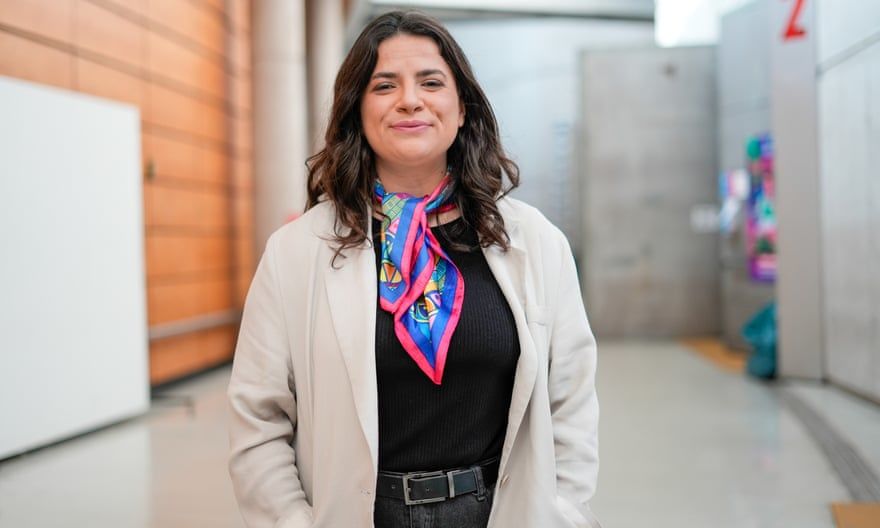President Gabriel Boric promised to initiate a feminist movement but conservative values remain strong in the country
One tumultuous year has now passed since Latin America’s first self-declared feminist government installed itself in La Moneda, Chile’s presidential palace, vowing to bring progressive, gender-equal politics to a quiet corner of South America.
Standing beside the country’s youngest ever president, Gabriel Boric, at his inauguration was Izkia Siches, the first woman to be named Chile’s interior minister and one of 14 women in Boric’s 24-person cabinet – the highest proportion of female ministers in Latin America and one of the highest anywhere in the world.
Two cabinet reshuffles later, Boric has just about retained parity, with 12 women in his government.
“In general, Chile is more advanced than other countries in the region in terms of women’s participation in politics,” said Antonia Orellana, whom Boric chose to lead the ministry of women and gender equality.
Orellana, whose principles were forged in the same student movements as Boric, retains a fiery resolve to change her country and a keen appreciation for those who have gone before.
“It is really important for us young feminists to recognise the efforts of previous generations,” she said. “One of the beautiful things about the feminist movement is that each generation leaves behind greater freedoms for the next.”
The daughter of a poet and a teacher, Orellana was born in Santiago and attended her first demonstrations at the age of 14 at a time when Chile’s feminist movement was gaining strength.
In 2015, the #NiUnaMenos movement was born in neighbouring Argentina as a howl of protest against violence against women. It quickly spilt over the Andes into Chile, where it was followed by a wave of feminist university strikes in the winter of 2018 which brought the higher education system to a standstill.
In October 2019, an era-defining outbreak of protest rocked the country, ultimately propelling a young generation of politicians to the national government.
 Antonia Orellana, Chile’s minister of women
and gender equity. ‘It is really important for us young feminists to
recognise the efforts of previous generations.’
Antonia Orellana, Chile’s minister of women
and gender equity. ‘It is really important for us young feminists to
recognise the efforts of previous generations.’
Orellana was there in the background at every turn, and having joined Boric’s party, helped coordinate the gender aspect of his 2021 presidential programme, setting out the future government’s feminist credentials.
In his first state of the nation address in June last year, President Boric declared that he would put gender parity and equality at the heart of all government business. He even installed the women’s and gender equality ministry in an office in La Moneda, for the first time. (Boric’s ultraconservative opponent in the election, José Antonio Kast, had initially proposed to abolish the ministry altogether.)
“That a government can declare itself ‘feminist’ in this day and age means that the movement has made itself impossible to ignore,” said Alondra Carrillo, a spokeswoman for the Coordinadora 8M, a feminist group with chapters across the country.
However, Carrillo warned that some activists are wary of associating too closely with a government whose actions will ultimately be attributed to the feminist cause.
Conservative values remain strong in Chile and recently, issues such as public security and immigration have superseded the long-term drive for equality.
According to a recent survey carried out by pollster Criteria, 58% of Chileans still consider their country machista, and 82% of men and 65% of women said they felt little or no connection to Chile’s feminist movement.
Furthermore, on 4 September, Chileans rejected a draft constitution which would have enshrined gender parity across government institutions, recognised domestic work as economic activity, and paved the way for reproductive rights to be expanded for Chilean women.
“[The government’s] feminism cannot simply be performative,” said Javiera Arce-Riffo, a political scientist at Chile’s Universidad Católica del Norte. “After the plebiscite result, I think they realised that they weren’t going to have the parliamentary majorities to change Chile, nor the constitutional framework to do so.”
Despite the setbacks, however, Orellana’s ministry has been busy in the legislature.
A bill granting the right to a life free from violence has been reactivated in congress, and a law guaranteeing reparations to the children of femicide victims passed the lower house this month without a single vote against it –hinting at broader consensus on some of the government’s programme.
Before the end of the year, the government hopes to present its national care system. One of the tenets of its programme is ultimately recognising and remunerating domestic and care work.
A national carers register has already been created, as has a list of those owing family maintenance payments.
“No progress is irreversible,” said Orellana, sounding a note of caution. “It must be sustained over time by finding broad consensus which lasts from government to government.”
Over the next year, the ministry hopes to improve women’s economic autonomy and workplace through an overhaul of the daycare system. Orellana also announced a plan to roll out low-cost contraceptives.
Access to free and safe abortions has driven the Chilean feminist movement since the return democracy following Gen Augusto Pinochet’s dictatorship (1973-1990).
However, it is unlikely to become reality over the course of the current government with congress finely balanced between the ruling coalitions and opposition.
Abortion has been decriminalised in Chile since 2017 if the pregnancy was the result of rape, if the mother’s life is at risk, or if the foetus is inviable.
“By the end of this government, I’d like us to have consolidated the progress made by previous generations of feminists,” she explained.
“After all, they’re very much part of this movement too.”















